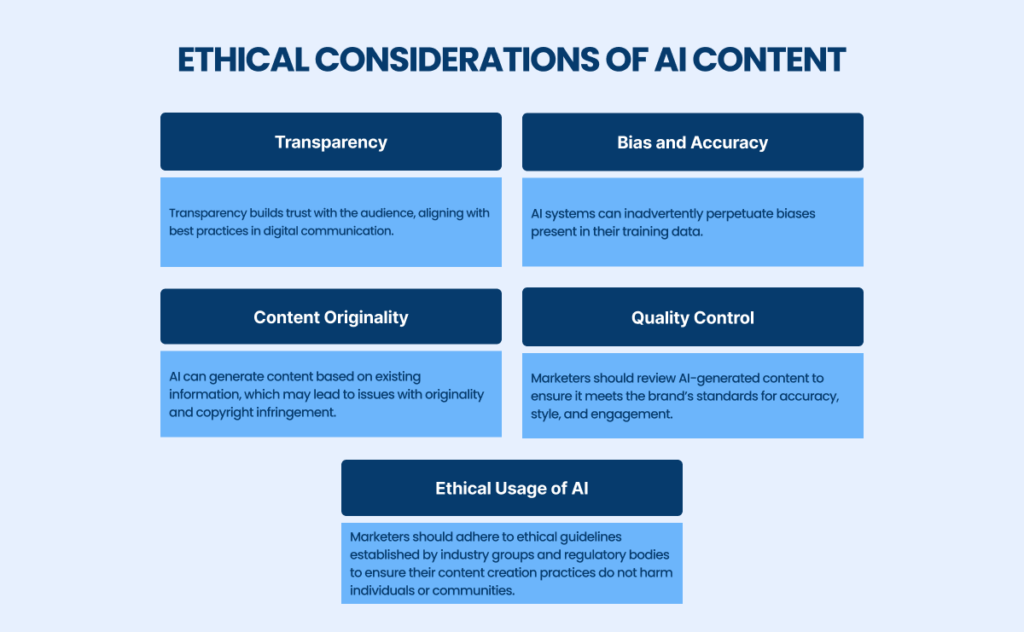Good content isn’t about good storytelling. It’s about telling a true story well.
One of the leading voices in content marketing, Ann Handley’s impactful response highlights that the content marketing landscape is evolving at an extremely fast pace.
What worked yesterday might not be relevant today, and what’s effective today could be obsolete tomorrow.
It’s a dynamic world where the rules of engagement are constantly changing.
In 2025, content marketing industry revenue was estimated at roughly 82.3 billion U.S. dollars.
Moreover, research shows that 90% of all organizations use content in marketing.
To thrive in this ever-evolving landscape, businesses must be adaptable, innovative, and deeply connected to their audience.
Cooperating with a prominent Content Marketing Agency can benefit the overall working strategy and suggest expert insights and innovative approaches.
The blog post will explore the challenging world of content marketing and clarify the key trends shaping its future.
Emerging Content Marketing Trends For 2026
The digital landscape continues to evolve at a rapid pace, bringing new content marketing trends to the forefront for 2026.
These trends not only reflect changing technologies and consumer behaviors but also underscore the importance of adaptive strategies for content marketers.

Voice Search Optimization
As search engines become smarter and voice-activated devices more prevalent, voice search becomes an essential component of modern content marketing.
This trend is driven by the increased use of AI assistants like Siri, Alexa, and Google Assistant.
How Voice Search Changes Content Strategy
Voice search significantly alters content marketing strategies due to its impact on search queries. Traditional text-based searches often differ from voice searches, which tend to be more conversational and longer.
Source: Emarketer
Content designed for voice search needs to cater to these natural language queries, emphasizing more colloquial phrases and complete sentences.
This shift demands a change in how content is structured as the priority moves toward answering questions directly and succinctly.
Integrating voice search into a content strategy involves considering content marketing metrics and measurement differently. For instance, the focus might shift towards increased visibility in voice search results as a key performance indicator.
Source: Industries that will increase their use and application of voice technology, Statista
Content marketing stats indicate a growing number of searches are voice-based, with users expecting instant and accurate answers.
Therefore, content should be optimized not only for keywords but also for relevancy and context.
AI-Driven Content Creation
In the dynamic realm of content marketing, AI-driven content creation emerges as a revolutionary trend, reshaping how brands conceptualize and execute their content strategies.
Forbes notes that the AI market size is expected to reach $407 billion by 2027.
This innovative approach leverages artificial intelligence to produce engaging content more efficiently, ensuring content quality and relevancy at scale.
Source: Forbes
As we delve deeper into 2026, understanding the implications of AI in content creation becomes imperative for content marketers aiming to stay ahead in a competitive landscape.
Tools and Technologies Leading the Way
Several advanced AI tools lead content creation, each offering unique capabilities to enhance and streamline the production process:
- Natural Language Generation (NLG) Engines: Tools like ChatGPT have revolutionized content creation by generating readable and contextually relevant text based on input parameters. These engines are instrumental in drafting articles, reports, and even more nuanced content like poems or scripts.
- AI Content Editors: Platforms such as Grammarly and Hemingway use AI to refine content quality, ensuring it is not only grammatically correct but also engaging and clear for the intended audience.
- Content Personalization Engines: AI algorithms tailor content to individual preferences and behaviors, increasing engagement through highly relevant experiences.Tools like Adobe Experience Manager use AI to adapt content in real-time based on user interactions.
- Automated Research Tools: AI streamlines research. It quickly gathers and synthesizes data to keep creators updated on trends and seamlessly integrate relevant insights.
- Image and Video Generation Tools: AI tools like DALL-E and Deepfake create visuals that match text, boosting content appeal.
They speed up creation and ensure content is optimized for both search engines and human readers, following trends.
Ethical Considerations of AI Content Creation
While AI-driven content creation offers numerous advantages, it also poses ethical challenges that marketers must navigate carefully.

Adopting best practices in AI content creation goes beyond efficiency, promoting a responsible approach that respects audiences and societal norms.
As AI technology continues to evolve, staying informed about content marketing measurement and statistics will enable marketers to use AI tools effectively and ethically, ensuring their content strategies achieve the desired impact while maintaining integrity and trust.
Interactive Content
Interactive content remains a key pillar in digital marketing, evolving with advancements in technology and shifting consumer preferences.
This content type is key as brands seek immersive ways to engage audiences on social media and beyond.
Types of Interactive Content Rising in Popularity
Several formats are gaining traction in interactive content, reshaping how content marketers approach engagement and message delivery.
This shift is backed by statistics showing higher engagement with interactive content than with traditional static formats.
Quizzes and Polls
Quizzes and Polls have become increasingly popular for their simplicity and effectiveness in driving engagement. They not only capture the audience’s attention but also encourage them to interact with the content in a meaningful way.
Quizzes can be customized to consumer preferences, offering insights that guide future content marketing strategies. They are easy to integrate on websites and social media platforms, making them versatile tools for engagement.
Augmented Reality
Augmented Reality (AR) Experiences are transforming the way brands present products and stories.
AR lets users visualize products in their space or interact with digital elements, offering a unique brand experience. In 2023, the AR hardware market was valued at 2.4 billion U.S. dollars.
Source: Exploding topics
This technology has seen rapid adoption in industries like retail, real estate, and education, where the visualization of content can significantly enhance the user’s understanding and engagement.
Virtual Reality (VR)
So, Virtual Reality (VR) Tours offer an immersive experience that can transport users to different places or situations.
Virtual Reality Market is projected to grow from USD 20.83 billion in 2025 to USD 244.84 billion by 2032, exhibiting a CAGR of 28.6% during the forecast period (2025-2032).
Source: Fortune Business Insights
Whether it’s a virtual home tour in real estate, a virtual trip to a remote destination in travel marketing, or a behind-the-scenes look at a company’s operations, VR creates a compelling narrative that users can experience firsthand.
As VR technology becomes more accessible, more marketers incorporate it into their digital marketing strategies to stand out and captivate their audience.
Interactive Videos
Interactive Videos have revolutionized video marketing by allowing viewers to make decisions that affect the story or outcome of the video. This format is particularly effective on social media platforms where users are looking for engaging and novel content.
Source: Wyzowl
91% of businesses use video as a marketing tool – maintaining an all-time high since we started tracking this data in 2016.
Interactive videos can lead to higher view times and increased engagement, as they provide a more dynamic and participatory experience than traditional video content.
Webinars and Live Streams
Webinars and Live Streams continue to be effective for real-time interaction with audiences. These platforms allow for live questions, reactions, and discussions, making them ideal for educational content, product demonstrations, and expert interviews.
The real-time element helps in building trust and authority, as viewers can receive immediate responses to their queries, making the content more relevant and engaging.
As we look at these types of interactive content, it’s clear that they serve various strategic roles within content marketing. They are not just tools for engagement but also powerful mechanisms for data collection and customer insight.
Each user interaction provides data that can be analyzed to better understand audience preferences, behaviors, and needs. This information can then be used to refine content strategies and create more targeted, AI-generated content, ensuring that each piece of content not only attracts attention but also delivers value to the brand and its audience.
Personalization at Scale
In 2026, personalization continues to dominate content marketing trends, reflecting growing consumer demand for experiences tailored specifically to individual preferences and behaviors.
As content marketing managers strive to make every interaction more relevant and impactful, the challenge lies in scaling this personalization without sacrificing the personal touch that consumers value.
Source: McKinsey research
This balance is critical as businesses expand their content marketing efforts to reach broader audiences while aiming to resonate on a one-to-one level.
Leveraging Data for Hyper-Personalization
Hyper-personalization goes beyond basic customization techniques like inserting a customer’s name in an email. It involves using detailed data to craft content that anticipates needs, preferences, and future behavior.
Companies that leverage their Hyper-Personalization tactics capture 40% more value and grow faster. In today’s data-driven marketing environment, effectively leveraging this kind of data is both a strategic imperative and a competitive advantage.
Data Integration and Aggregation
Successful hyper-personalization starts with robust data integration.
Content marketing managers must ensure that various data streams—social media interactions, website visits, purchase history, and customer service engagements—are integrated into a cohesive data ecosystem.
This comprehensive view allows marketers to understand the nuances of customer behavior and preferences.
Effective data aggregation can highlight trends and patterns that guide content personalization strategies.
For instance, if content marketing statistics show that a significant segment of your audience engages more with video content than with text-based content, this insight can drive more personalized video content creation tailored to the topics and formats most likely to engage this group.
Declining Content Marketing Strategies
As the digital marketing landscape continues to evolve, certain content marketing strategies are losing their effectiveness. Shifts in consumer behavior and technological advancements are rendering old practices obsolete.
Marketers must adapt to these changes to stay relevant and competitive. Here’s a deeper look at some of the strategies that are on the decline and the reasons behind their decreased relevance.
Generic Content
The era of generic, one-size-fits-all content is fading as audiences demand more personalized and relevant experiences.
Content marketing statistics indicate a strong preference for customized content, with consumers more likely to engage with brands that tailor their messaging to individual interests, behaviors, and needs. This shift is driven by the availability of data and sophisticated analytics tools that allow marketers to understand and segment their audiences more effectively than ever before.
Content marketing strategies that focus on producing broad, undifferentiated content are seeing diminishing returns. The trend is moving toward creating content that speaks directly to different segments of the audience or even individual users.
This requires a departure from generic content production to a more targeted approach that leverages data insights to deliver relevant messages.
Over-Reliance on Paid Media: Challenges with Ad Fatigue and Rising Costs
An over-reliance on paid media is another strategy experiencing a downturn. As more companies flood social platforms and search engines with ads, users are becoming increasingly adept at tuning them out, leading to ad fatigue.
Furthermore, the cost of paid media is rising, making it an increasingly expensive option. This trend is forcing marketers to reconsider their content marketing budget allocations, seeking more cost-effective ways to reach and engage their audiences.
The effectiveness of paid media campaigns is waning, with lower ROI and higher customer acquisition costs. These challenges compel marketers to look for alternative strategies that capitalize on organic reach and genuine engagement.
Alternatives to Paid Media for Organic Growth
In response to the challenges posed by paid media, many brands are turning to organic growth strategies. These include SEO, content marketing, and leveraging social media platforms to build communities rather than just broadcast ads.
Creating valuable content that audiences want to search for and share can help increase organic reach and reduce reliance on paid advertising.
Content marketing efforts that focus on user-generated content, influencer partnerships, and engaging social media content can drive organic traffic and build brand loyalty more effectively and at a lower cost than traditional paid media.
Ignoring User Experience in Content Design: Importance of UX in Content Creation
User experience (UX) is critical in content creation yet is often overlooked by marketers who are more focused on aesthetics or quantity of content.

A good UX design ensures that content is not only pleasing to look at but also easy to navigate, accessible, and relevant to the user’s needs. It involves understanding the user’s journey and creating content that enhances that journey at every touchpoint.
Neglecting UX in content design can lead to a disconnect between the content and its effectiveness in engaging and converting users. Content that is difficult to interact with or does not provide value can deter users, impacting overall marketing success.
How Poor UX Affects Content Performance
Poor UX can significantly degrade content performance. If users find content difficult to access, navigate, or understand, they are less likely to engage with it, resulting in higher bounce rates and lower conversion rates.
Source: Exploding topics
Content marketing statistics consistently show that enhancing UX leads to better engagement and conversion, as users appreciate and respond more positively to content that meets their needs and exceeds their expectations.
Partner with [A] Growth Agency for Your Effective Content Marketing Strategies
Content marketing is a long-term investment. It takes time and effort to see results.
But by staying consistent, adapting to changing trends, and measuring your progress, you can position your brand as a thought leader in your industry.
[A] Growth Agency will provide the expertise and support necessary to elevate your content marketing efforts.
Excellence is our standard. We cultivate a team of ‘A players’ – top-tier talents who bring passion and expertise to every challenge.
Moreover, we believe in the power of data to inform and drive every strategy, ensuring our actions are as effective as they are innovative.
Feel free to Get Your Free Marketing Plan.

